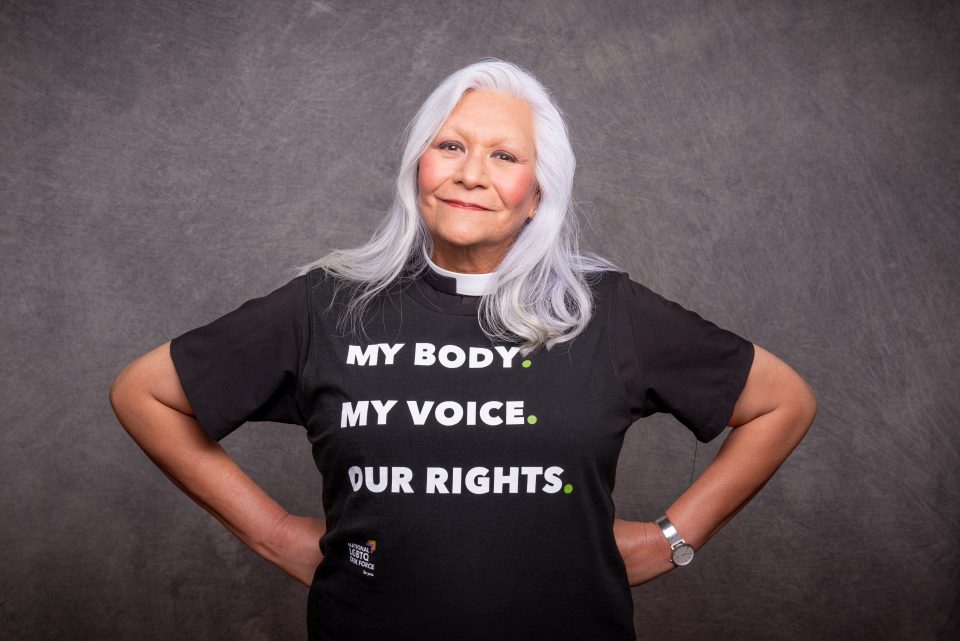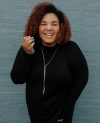The ELCA has a beautiful tapestry of cultures and identities that make up the church. We want to celebrate June and Pride Month with a focus on our LGTBQIA+ Lutherans. We are excited to amplify the voices of our ELCA siblings who are proud to be a part of the LQBTQIA+ community and work to affirm and embrace everyone in the church. Today we speak with speaking with Reverend Nicole Garcia.
How are you connected to the ELCA?
I was raised Roman Catholic, but in my early 40s, I found St. Paul Lutheran Church in Denver, and I officially became a member of the ELCA in October 2003. I joined the Reconciling in Christ task force at St. Paul and was elected to the board of directors of Lutherans Concerned/North America (LC/NA) in July 2008. I was a voting member of the 2009 ELCA Churchwide Assembly and took part in the adoption of the “Human Sexuality” social statement. I was co-chair of the board when LC/NA rebranded and began doing business as ReconcilingWorks: Lutherans for Full Participation. I left the board in 2014 when I was granted entrance to candidacy and began attending Luther Seminary in the distributed learning program. I earned a Master of Divinity from Luther Seminary in 2018. I was ordained in 2019 and began work as a mission developer in an ELCA mission start in Boulder, Colo. After 18 months I realized I was not the right person for that mission start and resigned my position. In April 2022, I began working as the faith work director of the National LGBTQ Task Force, and in October the ELCA Church Council issued a letter of call designating that role as my call to ministry.
How does your faith shape and affirm your person/identity?
My mother was an example of what a life as a devoted follower of Jesus Christ could be. I was raised as a faithful Catholic boy, but when I was in my early 20s, I discovered the truth about the Doctrine of Discovery and realized I was Catholic because my ancestors had been colonized. I became disillusioned about the church I loved. At about the same time in my life, I concluded that God refused to answer my prayers. I prayed day and night. I begged God to fix me, for I had feelings about my gender that I did not understand. My church and my God had both let me down, so I stopped going to church and stopped talking to God.
Twenty years later, at age 43, I started therapy and came to terms with the fact that God had created me as a transgender woman. At the same time, I felt a desire to rekindle my faith. I was told about a welcoming church in downtown Denver. I refused to attend because the church was affiliated with the heretical and excommunicated priest Martin Luther, but after several invitations, I relented. This was early in my gender transition, and I was nervous entering a church as Nicole. But I was received with open arms and told many times I was a beloved child of God. I found a home where I could celebrate my faith in my Lord, Jesus Christ. I also fell in love with Lutheran theology.
Since entering St. Paul, I have not only completed my gender transition but also earned a Master of Arts in counseling from the University of Colorado Denver and a Master of Divinity from Luther Seminary. I am now a licensed professional counselor (LPC) in the state of Colorado and a pastor in the ELCA. It took me 43 years to accept the fact that God had created me as a queer transgender Latina. Once I began living into my true identity, I flourished. I live my life as a person of faith, and my faith is the foundation of who I am and all I do as a human being.
What are your hopes and expectations for the way the church can support and affirm you?
It was incredibly difficult to realize that the mission start I served in Boulder liked the idea of being inclusive but that a small group within the church opposed my attempt to live into what it means to be fully inclusive of the LGBTQ+ community. I admit it is a challenge to address the layers of patriarchy and the gender binary in the liturgy. A critical review of our prayers and music reveals a significant amount of gendered language, and it is not easy to update the liturgy to address the desire to become welcoming of the LGBTQ+ community. When I encountered significant pushback from a small group within the mission start, I realized I could not remain in that position without compromising my integrity.
My bishop, Jim Gonia, walked with me through a very dark period in my life. He gave me the time I needed to heal. With the help of my therapist and my spiritual director, I did the work I needed to do to return to ministry. When I was offered the position of faith work director at the National LGBTQ Task Force, Bishop Jim encouraged me to accept the position and said he would support my request for the job to be a call to ministry. The Conference of Bishops waived the requirement of three years of congregational ministry and the ELCA Church Council issued a letter of call. I am gratified to know the ELCA acknowledges my work in advocacy and social justice to be the work of a pastor.
How can the ELCA support and uplift the LGBTQIA+ community?
The ELCA has made progress in supporting the LGBTQ+ community since the horrendous comments I heard from the microphones at synod and churchwide assemblies in 2007 to 2009. I have worked for more than a decade to help my church move toward the full inclusion of the LGBTQ+ community. I am happy to say I am not the only transgender or nonbinary pastor in the ELCA. As far as I know, however, I am the only transgender Latinx person to be ordained. I hope the ELCA will continue to explore how candidacy can be updated to recognize the diversity of the identities and experiences of individuals who want to serve the church in a variety of ways.
I am disappointed in the lack of response by the ELCA to the virulent attacks against the transgender and nonbinary communities across the nation. Over 530 anti-LGBTQ+ bills have been considered, and many have become law, making it illegal for transgender and nonbinary people to use the restroom, access health care or play sports. The transgender and nonbinary community constitutes less than 2% of the population in the United States. By and large, transgender and nonbinary individuals are under- or unemployed due to discrimination and marginalization. We have virtually no political power, so we need your help to save our lives.
What gives you hope?
My faith in Jesus Christ as my Lord and Savior gives me hope. So far in 2023, I have visited Florida, Tennessee, Texas and North Carolina. I have seen and heard firsthand the hate-filled rhetoric directed toward the LGBTQ+ community and especially the transgender and nonbinary community. My hope comes from the personal messages of support I receive from pastors, deacons and lay leaders throughout the United States. I feel the love and commitment from individuals who encourage me in my work with the National LGBTQ Task Force.
What do you pray for?
I pray for the safety of trans and nonbinary youth who live in the states where gender-affirming care is being denied. I pray for trans and nonbinary people who are being forced to de-transition because their medical practitioners are too afraid of losing their medical licenses if they provide gender-affirming care. I pray for all the people who have lost the right to bodily autonomy because Roe v. Wade was overturned. I pray that the theology of scarcity will be replaced by the theology of abundance. The Lord God has provided enough for each human being to thrive—but fear, greed and a desire for power and domination have divided us as a nation. I pray we will find a way to listen to each other and to care for one another as our Lord, Jesus Christ, taught us.





